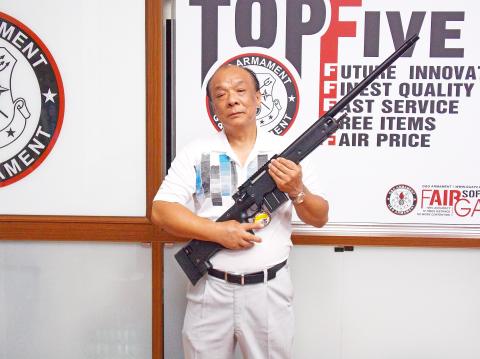Toy gun maker sent to prison
TOO REAL: The Criminal Investigation Bureau found the company’s airsoft guns to be too powerful, but justice ministry officials concluded the product met MOEA requirements

The Shilin District Court on Tuesday sentenced Liao Ying-hsi (廖英熙), owner of airsoft gun manufacturer G&G Armament, to two years and eight months in jail for violation of the Controlling Guns, Ammunition and Knives Act (槍砲彈藥刀械管制條例).
The case stemmed from 2015, when police seized an airsoft gun model G960 and ammunition and forwarded it to the Criminal Investigation Bureau for further analysis.
The bureau concluded that if metallic bullets were used and the gun were equipped with a 22kg canister of gas, the bullets would exit the gun with between 24 and 32 joules of kinetic energy. Liao was indicted by prosecutors, as the results exceeded the legal threshold of 20 joules.
During court hearings, Liao said that products made by his company were in full accordance with regulations for toy guns as written by the Ministry of Economic Affairs, which state that the standard for gauging the level of danger for toy guns is based on the pellets — non-spherical bullets for air guns — which must not be made of metal, should not be injected with liquids and must be used with the propellant suggested by the manufacturer. G&G Armament specifically recommended that users load the gun with 12kg gas canisters. Liao had the same gun tested by the Ministry of Justice’s Investigation Bureau, which found that the product met regulations.
However, the presiding judge ruled that the economics ministry’s regulations and the act were two separate matters. The judge said G&G Armament’s gun met the definition of “gun” as specified in the act: “Any sort of equipment that can shoot metals or bullets and has the capability of damaging or injuring others.” The capability of causing harm should be judged according to “the maximum capability” and there was nothing wrong with testing G&G Armament’s product using the most powerful propellant on the market, the judge said.While the company has explicitly stated that users should outfit its products with 12kg canisters and warned people not to use metal pellets, 20kg canisters and metal pellets are easily obtainable on the market and would therefore make the G960 product dangerous, the ruling said. Liao said he was surprised at the ruling and that he would launch an appeal due to the different standards used by police and the ministry, adding that the government should seek to unify such standards as soon as possible, or the majority of Taiwan’s airsoft gun manufacturers would be forced to leave the nation.